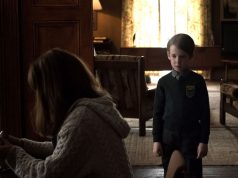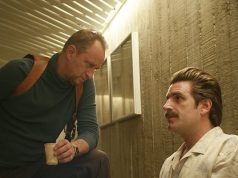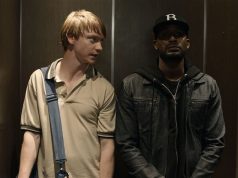Beaufort Castle is an ancient fortress in southern Lebanon that came under Israeli control at the start of the 1982 Lebanon War, and stayed that way until Israel abandoned it in 2000. The film “Beaufort,” an Oscar nominee in the foreign-language category, depicts the last few days of the occupation, entirely from the point of view of the final group of Israeli Defense Forces soldiers to be stationed there.
Any film about Israel is bound to be fraught with political powder kegs, more so if the Israeli military is the subject. On IMDb I see message board threads with titles like “A very dangerous propaganda movie” and “Is this pro or anti Israel?,” and I realize the film is (to quote Stephen Sondheim) fraughter than I thought.
Evidently the matter of occupying Beaufort and southern Lebanon is a sore subject in Israel — why, it reminds me of a certain other country where the citizens are divided on whether their military’s presence in a foreign land is necessary. “Beaufort” is a fine war picture, one that spotlights war’s wastefulness and futility, and humanizes its soldier characters. It doesn’t make a statement on the rightness or wrongness of the Beaufort occupation, though it does comment on the absurdly drawn-out process of leaving it. And even if it did say the whole thing was a mistake to begin with, would that make it “anti-Israel”? No more so than being against the U.S. occupation of Iraq makes one “anti-American.”
The commander at Beaufort is Liraz (Oshri Cohen), a young and uncertain leader, enigmatic to the men he supervises. When a bomb expert, Ziv (Ohad Knoller), arrives to inspect a suspicious object on the dirt road outside the base, then declares the mission too dangerous, Liraz is angry. He thinks Ziv is just trying to get out of doing some work. They have to determine whether the bomb is armed in order to clear the road — “a road that only we use,” notes another soldier, Koris (Itay Tiran), with the cynicism and weariness of an enlisted man who’s seen it all and has become disillusioned.
Koris makes a good point about the relative value of this particular dirt road, and Liraz starts to grow frustrated with his own commanders. The Lebanese, aware that Israel is about to leave Beaufort, have started shelling the base to make it look like they’re chasing them out. Liraz pragmatically insists that they should either leave immediately, or stay and fight. This endless dithering and delaying is stupid and costly — costly because the longer they stay put, the greater the chance of their men being killed while standing watch at Beaufort’s command posts. As casualties mount, Liraz becomes more anxious to leave Beaufort.
Directed by Joseph Cedar and based on Ron Leshem’s novel, “Beaufort” is a war movie with no warfare, apart from mortar shells being fired by an unseen enemy. (Note that the Beaufort group’s military commanders are never seen, either.) The tension in several scenes comes from wondering when or if an explosion will occur, and Cedar directs these sequences with great restraint. Certain elements of the story are predictable, drawn from the template of the old-style war movies (if you share a candid, quiet moment with the platoon leader, you’re gonna die), but it generally feels fresh and insightful, not to mention timely. Why spend all that time, and sacrifice all those lives, just to guard a hill that you’ll eventually abandon anyway? I guess that’s war for you.
B+ (2 hrs., 5 min.; Hebrew with subtitles; )





